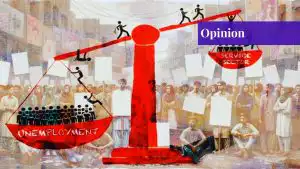In recent years, Pakistan has experienced a marked and fast-increasing exit of its people. This mass move of migrants evidences profound structural problems and ambitions in the country that are driven by different factors such as the economy, education, politics, or social issues. Mass emigration is a pertinent problem that Pakistan needs to address urgently.
The figures tell an interesting story: 800,000 Pakistanis went abroad in 2023 alone, up by a striking 10% from the previous year. Such emigration is accompanied by long-term residency shifts with over 100,000 Pakistani nationals settling in Canada, Australia, and America only last year. Furthermore, a huge flow of remittances proves the considerable economic contribution made by the diaspora hence economically supporting the home country even though its population is absent. Nevertheless, this financial lifeline also points to a deep contradiction that the brightest and most talented professionals have been leaving thus seeking open ways toward more stable and prosperous environments.
The tug of economic opportunity is strong; many Pakistanis are lured overseas by higher-paying jobs and better working conditions in contrast to their own home country where job creation often fails to keep pace with the population growth. Pakistani professionals have created a place for themselves in industries ranging from construction, finance, and hospitality in the United Arab Emirates (UAE)—finding a higher salary scale and assured financial stability, something that is difficult to achieve back in their nation.
Pakistani Emigrants and Overseas Employment
Muneeb Ali’s is an interesting case study. Muneeb, a Pakistani tech entrepreneur, has been able to make a name for himself through his innovative work on Blockstack, a blockchain-based platform that has earned him followers in the world of technology. Students who pursue education at top international institutions usually transition easily into successful careers, turning their temporary academic venture into a permanent success story outside their home country. Not to mention Huma Abedin, who in her journey from Pakistani American student to fashion and philanthropy maven, underscores the opportunities available abroad, outside Pakistan.
This migration trend is not only about seeking personal gains, it reflects the deep issues within Pakistan. Political instability, the widespread corruption found at every level of government, and security problems still plaguing the nation have driven many people to seek refuge and better opportunities in more stable countries. Ineffective governance and a general atmosphere of uncertainty are the forces that drive one to trade homeland for promised security and political stability.
Emigration from Pakistan — A Curse or Blessing in Disguise?
The emigration phenomenon is equally noteworthy. Emigration redefines the composition of the family, often involving distant relationships and complicated cultural changes with them. While challenging, these changes facilitate intercultural exchanges and enhance Pakistan’s international visibility, allowing Pakistani culture to influence foreign societies.
However, the emigration phenomenon is also problematic. The departure of skilled professionals and educated youth results in what is known as the brain drain—which poses serious implications for a country like Pakistan in terms of future development as this talent exodus cuts across multiple sectors from technology to healthcare, thus potentially depriving nations of much-needed innovation.
What is even worse is that it shows the great distance between migrants’ dreams and economic realities, indicating an urgent necessity for all-round changes. A comprehensive strategy is necessary to work on this issue. Job creation with economic development, quality education policy for talent retention, and political stability signaling unsafe space are necessary elements of such a strategy.
The imperative now is to shore up our infrastructure, buttress local industries, and enrich the educational fabric of society if we are to reverse emigration. Stability and retention of talent will depend largely on the success of political reforms to improve governance practices while driving down corruption.
Strengthening socio-diasporic networks of migrating individuals and families can help reduce the negative social effects possibly indoctrinated by migration—essentially an informal safety net might counteract some level of integration back home.
For Pakistan then, the migration of its citizens outwards is a many-headed beast. Not only is it an escape from visibly insufficient opportunities but also a way to dodge existing problems. It is a challenge and an opportunity for the Government of Pakistan—the opportunity to leverage one of our most successful global products (Pakistani diaspora) in light of treating some root causes back home that are driving this very diaspora away. Investing in economic growth, quality of education, and political stability can help set the right environment for Pakistan to harness advantages from its diaspora like other nations whilst ensuring benefits coming their way do not end in the developed world.
The emigration from Pakistan is a story of hope and change, but it also highlights the continued struggle for better lives that typify the increasingly complex globalizing dynamics in which our nation attempts to maneuver itself toward an improved and prosperous future.
If you want to submit your articles and/or research papers, please check the Submissions page.
The views and opinions expressed in this article/paper are the author’s own and do not necessarily reflect the editorial position of Paradigm Shift.
Maryem Abbas, Country Manager at Breeo International, specializes in top-tier university recruitment, helping students secure spots in the top 100 global universities. A Lahore School of Economics graduate, she's passionate about career development and transforming students' lives through education and professional opportunities.






